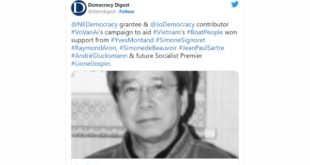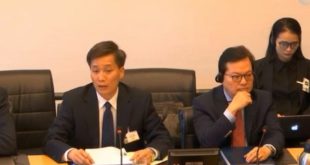BANGKOK, 15 October 2010 (The Irrawaddy) – Thailand has drawn fire by again preventing a prominent Vietnamese dissident from speaking at a conference in Bangkok, one year after the founding of the Asean Intergovernmental Commission on Human Rights.
The president of the Vietnam Committee on Human Rights, Vo Van Ai, was refused a visa by the Thai Embassy in Paris, the second time that he has been prevented from travelling to Bangkok in recent weeks.
His previous visa was cancelled in the run-up to a stillborn September launch of a critical report on human rights in Vietnam, a move which brought international criticism upon Thailand.
An empty chair marked the place where Vo Van Ai was to have delivered a lecture titled “Universality and Particularity in Human Rights: A Vietnamese Buddhist Viewpoint” at the “First International Conference on Human Rights in Asia.” The event drew scholars and activists from across southeast Asia and beyond and was held by the Southeast Asia Human Rights Network (SEAHRN) and Bangkok’s Mahidon University.
Speaking today, Dr. Srirapha Petcharamasree read letter from Vo Van Ai to SEAHRN, in which he said that “the attitude of the Thai government is particularly shocking given that Thailand holds the presidency of the UN Human Rights Council.” Dr. Srirapha is Thailand’s representative at the AICHR, but stressed that she was speaking in a personal capacity. She called on the Thai Government “to be faithful to the commitment made to the UN when it made its candidacy to the presidency.”
In September, Thai authorities refused to grant entry to Vo Van Ai and Penelope Faulkner, respectively the president and vice president of the Vietnam Committee on Human Rights, following pressure from Vietnam, when they sought to travel to Bangkok to launch a report on human rights in Vietnam.
Another Vietnamese speaker who was scheduled to address the SEAHRN gathering on Thursday pulled out at the last moment, after hearing that Vo Van Ai would not be present. According to the conference organisers, the man, whose identity cannot be confirmed for security reasons, was wary of Vietnamese government attention on the conference, where a number of papers were to be presented on that country.
Coming as Southeast Asia takes stock of developments in human rights, and one year after the AICHR was launched in Hua Hin, Thailand, the barring could undermine Thailand’s professed commitment to human rights, which Foreign Minister Kasit Piromya described as a cornerstone of Thai foreign policy when addressing the UN General Assembly recently.
Differing interpretations of human rights could, in some views, undermine how rights issues are addressed in Southeast Asia, say some. Challenging what he termed “Western universalism,” Asean Secretary-General Surin Pitsuwan told the SEAHRN gathering that others “should not impose on us.”
Surin acknowledged that progress with human rights has been piecemeal in the region, but that progress would come “in [an] evolutionary manner,” and reminded the audience that it took centuries of progress before human rights laws were fully implemented in the West.
The AICHR has been dismissed for having no oversight or punitive arm, prompting critics to say it will do little to protect human rights in Southeast Asia.
“It does not have a complaints mechanism or investigative powers,” lamented Vitit Muntarbhorn, a former UN envoy to North Korea and a law professor at Bangkok’s Chulalongkorn University. “A human rights declaration is not enough we need an Asean human rights treaty and regional human rights courts.”
Asean countries have typically shied away from criticizing each other, with a culture of non-interference seen as a major barrier toward human rights promotion and protection, according to Azmi Sharon, an academic at the University of Malaya. However, the formation of the relatively toothless AICHR may be a step in the right direction.
Carlos Medina, the executive director of the Ateneo Human Rights Center in the Philippines, recounted his long engagement with Asean officials and government representatives on setting up AICHR. He said that over time attitudes are changing. “Mostly, they no longer see us activists as adversaries,” he said.
With elections coming up in less than a month, Burma was widely discussed at the SEAHRN event. The country remains the prime example of egregious human rights violations in the region, according to some of the speakers discussing the military-run country.
A Burmese activist, Ko Bo Byi, added a poignant and real-world edge to the academic tone, by describing in detail his torture at the hands of Burma’s security forces.
He spent seven years in a Burmese jail and now leads the Assistance Association for Political Prisoners-Burma, which monitors the number of and the conditions facing the 2,100-plus prisoners currently detained for political beliefs or activism.
He told The Irrawaddy that there is no indication yet as to whether political prisoners will be released as part of the planned freeing of 1,1000 prisoners in Burma before the Nov. 7 election.
“I would not be surprised if some political prisoners are released, as a public relations stunt before the elections,” he said.
His AAPP colleague, Hannah Scott, provided more details about what she described as “a systematic and widespread system of torture” imposed on political activists, 144 of whom have died in prison since 1988. All told, more than 10,000 political prisoners are estimated to have passed through Burma’s torture gulag since the student uprising against military rule that year, she said.
“There are 109 hard labor camps that we know of in Burma, and children as young as 14 have been tortured for political issues,” she said.
 Quê Me Quê Me: Action for democracy in Vietnam & Vietnam Committee on Human Rights
Quê Me Quê Me: Action for democracy in Vietnam & Vietnam Committee on Human Rights





